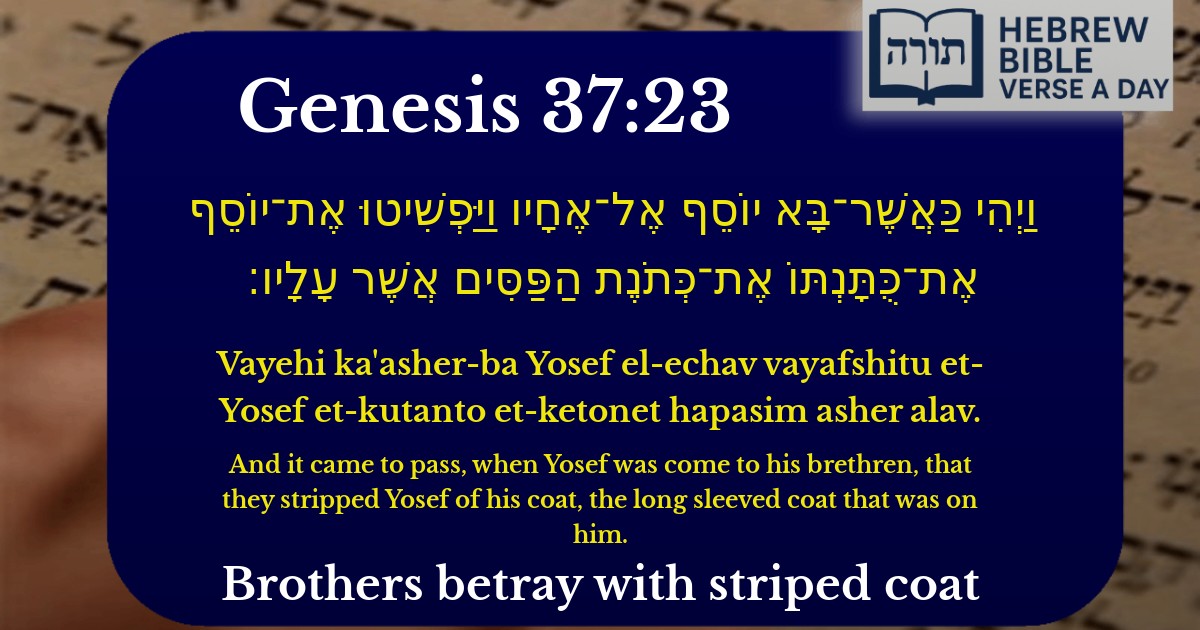Join Our Newsletter To Be Informed When New Videos Are Posted
Join the thousands of fellow Studends who rely on our videos to learn how to read the bible in Hebrew for free!
Hebrew Text
וַיְהִי כַּאֲשֶׁר־בָּא יוֹסֵף אֶל־אֶחָיו וַיַּפְשִׁיטוּ אֶת־יוֹסֵף אֶת־כֻּתָּנְתּוֹ אֶת־כְּתֹנֶת הַפַּסִּים אֲשֶׁר עָלָיו׃
English Translation
And it came to pass, when Yosef was come to his brethren, that they stripped Yosef of his coat, the long sleeved coat that was on him.
Transliteration
Vayehi ka'asher-ba Yosef el-echav vayafshitu et-Yosef et-kutanto et-ketonet hapasim asher alav.
Hebrew Leining Text
וַיְהִ֕י כַּֽאֲשֶׁר־בָּ֥א יוֹסֵ֖ף אֶל־אֶחָ֑יו וַיַּפְשִׁ֤יטוּ אֶת־יוֹסֵף֙ אֶת־כֻּתׇּנְתּ֔וֹ אֶת־כְּתֹ֥נֶת הַפַּסִּ֖ים אֲשֶׁ֥ר עָלָֽיו׃
וַיְהִ֕י כַּֽאֲשֶׁר־בָּ֥א יוֹסֵ֖ף אֶל־אֶחָ֑יו וַיַּפְשִׁ֤יטוּ אֶת־יוֹסֵף֙ אֶת־כֻּתׇּנְתּ֔וֹ אֶת־כְּתֹ֥נֶת הַפַּסִּ֖ים אֲשֶׁ֥ר עָלָֽיו׃
🎵 Listen to leining
Parasha Commentary
📚 Talmud Citations
This verse is quoted in the Talmud.
📖 Shabbat 10b
The verse is referenced in a discussion about the importance of clothing and dignity, illustrating how Joseph's brothers stripped him of his special coat.
📖 Sotah 13b
The verse is mentioned in the context of discussing the actions of Joseph's brothers and their consequences, highlighting the severity of their betrayal.


Rashi's Explanation of the Stripping of the Coat
Rashi (Bereshit 37:23) explains that the brothers stripped Yosef of his ketonet passim (ornamented tunic) as an act of degradation and humiliation. This was not merely about removing his clothing, but a symbolic rejection of Yaakov's special favor toward Yosef, represented by this garment. The stripping foreshadowed Yosef's descent from his elevated status as the beloved son to his subsequent suffering in Egypt.
Midrashic Insights on the Coat
The Midrash (Bereshit Rabbah 84:9) elaborates that the ketonet passim was a garment of distinction, similar to those worn by nobility. By removing it, the brothers sought to negate Yosef's perceived arrogance and dreams of leadership. The Midrash also connects this act to the future—just as Yosef was stripped of his coat, so too would the Egyptians later strip the Jewish people of their possessions before enslaving them.
Rambam's Perspective on Brotherly Conflict
Rambam (Hilchot De'ot 6:6) discusses the dangers of jealousy and strife, which are central themes in this episode. The brothers' act of stripping Yosef reflects the destructive consequences of unchecked hatred. Rambam emphasizes that disputes among family members are particularly grievous, as they undermine the unity of Klal Yisrael.
Symbolism of the Ketonet Passim
Traditional commentators note that the ketonet passim was more than a physical garment:
Halachic Implications of the Act
The Talmud (Sanhedrin 58b) discusses the severity of publicly shaming someone, comparing it to murder. The brothers' act of stripping Yosef in broad daylight (as implied by the narrative) was a grave violation of halacha, demonstrating how far their anger had led them astray from ethical conduct.